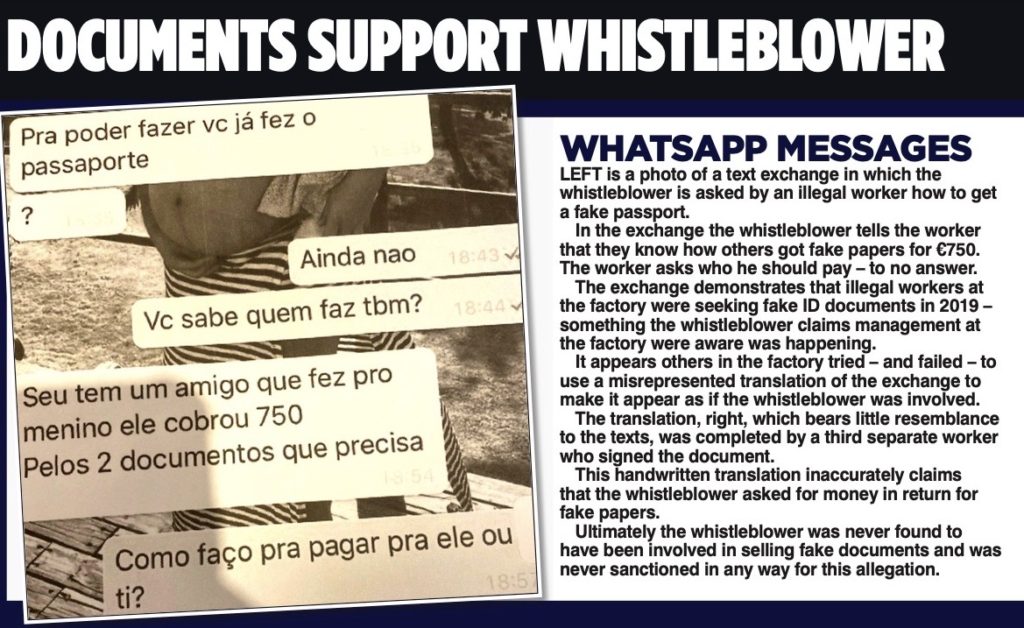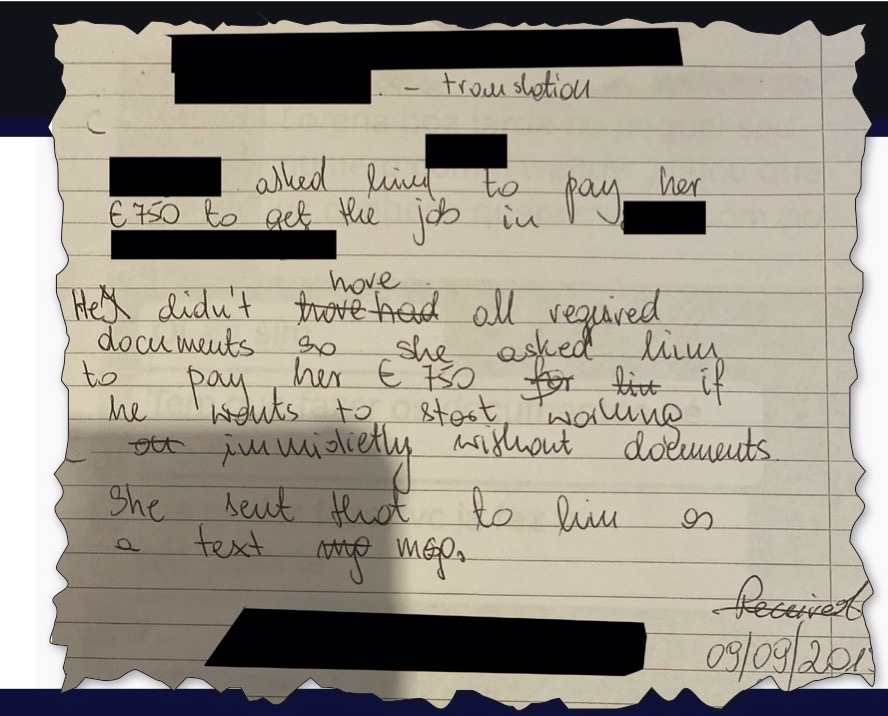MEAT factories employed illegal workers from Covid-19 high-risk countries such as Brazil as the nation struggles to combat the spread of variants.
An Irish Mail on Sunday investigation has uncovered a litany of alarming allegations about work practices in the meat processing industry.
Our investigation shows how:
- Workers are securing fake identities from criminal forgers to gain employment in meat plants;
- Illegal workers who have worked for years with fake identification are ‘laundered’ ‘through the work permit system;
- Employees assume the identity of previous workers to use their PPS numbers.
Today’s revelations raise serious concerns amid continuing Covid outbreaks at meat plants and the Government’s efforts to prevent the P1 variant, which originated in Brazil, from establishing a foothold here.
For months, worker representatives have been expressing concerns that the P1 variant is a real concern for staff in the meat processing sector – who have suffered more Covid cases than any other group of employees outside the health sector.
In a recent interview with the MoS, Dr Cillian de Gascun of NPHET warned of the urgent need for
One worker claimed he had worked illegally for years sick-pay laws that can help prevent migrant workers in meat factories from spreading the virus.
‘There are pockets of society here – people we depend on, whether it be for care or for food, who don’t necessarily have the liberty to stay at home for 14 days, secure in the knowledge that either they’ll be paid for that time or, indeed, that their job will be there when they go back,’ he said.
Last August the complete lockdown of three midland counties – while the rest of the country remained open – was attributed to Covid clusters at meat plants.
And today, after the Government has sanctioned the addition of further countries to the quarantine list, Ireland has so far recorded 19 cases of the P1 variant in locations such as Dublin, Waterford, Gal- way, Kildare, Tipperary and Limerick, where two new cases were recently recorded.
This week Dr De Gascun confirmed ‘some cases of community transmission are still under investigation’ with no obvious link to foreign travel.
But today’s revelations, allied to Ireland’s low rate of sequencing for variants, will increase concerns that strains such as P1 could already be more widespread here.
Before hotel quarantine was introduced two weeks ago, thousands of travellers from Brazil entered the country – many of whom were meat workers who simply ignored requests to report for testing.
And now, even with hotel quarantine in place, loopholes remain that allow illegal workers to enter Ireland after a stopover in a third country not on the quarantine list.
One such country from which workers often source their counterfeit IDs en route to Ireland – Italy – is the epicentre of the P1 variant in Europe with more cases of the variant than any other nation bar Brazil. Italy will not be added to the mandatory quarantine list until April 15.
Our investigation raises troubling questions about the illegal recruitment and exploitation of migrant workers. These claims have been outlined in a protected disclosure to the MoS by a whistleblower who has worked with a large meat plant for some years.
We have also interviewed a number of workers from this plant who speak candidly about their experiences of working illegally.
Documents obtained by the MoS include a text message exchange between the whistleblower and an undocumented worker who is seeking false documentation to enable him to work.

Other files include records that confirm an illegal worker we interviewed ‘I did small jobs and everyone is illegal’
was employed at the whistleblower’s firm without a work permit. One worker claimed he had worked illegally for years until he was badly injured. Today this individual is now illegally employed at a different meat plant – a feat he can achieve with little difficulty given the culture of the sector.
Separately, another employee who was employed via a legitimate work permit describes how he feels he was exploited before the firm refused to renew his permit.
Since he was let go, this individual has also worked illegally in a number of other meat plants without difficulty.
‘Many people in these places are illegal,’ he told the MoS. ‘More than 60% of the people who work there are Brazilian and illegal. I stayed a year and six months and did small jobs in these small factories and everyone is illegal.’

When questioned about bogus work permits, the factory owner, whose businesses post large profits annually, denied any wrongdoing.
He told the MoS it was possible some workers may be ‘using the wrong ID’ and that he made all work permit applications in ‘good faith’.
‘Possibly there’s things go on that we wouldn’t be aware of,’ he said. ‘If people are on false papers – if we find any information whatsoever – they’re dismissed of immediately.
‘We don’t know the people personally, we’re entitled to apply for permits as per the State regulations and if someone applies under a different name or something – if they come in through immigration, they’re all checked, they’re all licensed with the guards, everything is done correctly.’

The recruitment system in the meat factories is typically controlled by ‘capo’ type figures who run the kill lines and boning halls.
These tight-knit teams overwhelmingly consist of male workers, often from the same communities in Brazil, who help each other to beat employment and immigration laws.
‘They’re all licensed with the guards’
One favoured route is the procurement of fake ID documents from criminal networks – often in Portugal and Italy. National identity cards from these locations are considered easier to forge than passports and can be obtained directly by individual workers or via a number of online providers.
These ID papers are ordered to match the names of existing Irish
PPS numbers that have been bought or passed down from migrants no longer living in Ireland.
For example, in one case a nephew in his 20s appropriated the PPS number of a much older uncle who had returned to Brazil and combined this with fake ID papers to work at the plant.
In other cases, employees who previously worked illegally under assumed identities have successfully obtained work permits in their real names. This allowed them to leave Ireland and re-enter the country legally on their work permit with their service to the factory hardly interrupted.
Senior immigration sources said last night the issues highlighted today are commonplace throughout the meat industry.
In one raid on a different meat plant last year 19 workers were found to be in breach of work permit and immigration rules.
Having an employee work without a permit is an offence that could result in an employer being fined up to €250,000 and/ or jailed for 10 years.
One official said the authorities always struggle to find willing witnesses to bolster prosecutions. ‘This is a common occurrence but what we never get is people going on side to cooperate with us, and in order to investigate properly we need witnesses.’
The whistleblower who spoke to the MoS claims they personally raised concerns about undocumented workers being presented to them.
In response, they claim they were told: ‘We’re not here to check. We’re not immigration.’
‘They bring the papers,’ they were told. ‘We only did our job and photocopied them. We are not here to check if they’re fake or not. That’s what they told us.’
Reacting to today’s claims, Siptu’s agriculture and food sector chief Greg Ennis expressed frustration that recommendations made by the Oireachtas Special Committee on Covid-19 a year ago have not been implemented.
‘Despite all the publicity about meat plants and Covid in the last 12 months the recommendations made with regard to the meat industry have not been enacted by Government,’ Mr Ennis told the MoS.
He added: ‘The Government has a lot to answer for in its approach to protecting workers within the meat and low-paid food production sector.’
HSE refuses to say if 19 killer variant cases linked to meat plants
NINETEEN cases of the dreaded P1 variant, which originated in Brazil, have been found in Dublin, Waterford, Kildare, Galway, Tipperary and Limerick. Eight of these cases have been recorded in the past four weeks, the Irish Mail on Sunday has learned.
All of the counties in which the variant has so far been found have seen significant meat plant outbreaks at different times during the pandemic.
But the HSE is refusing to clarify whether or not any of the 19 known P1 cases involve meat plant workers – many of whom returned to Ireland from Brazil after Christmas and ignored requests to report for testing.
Thanks in part to the capability of the P1 variant to reinfect those previously infected, 66,573 people in Brazil have died from Covid in the month of March alone.
‘Never in Brazilian history have we seen a single event kill so many people in one month,’ Miguel Nicolelis, a former co-ordinator of Brazil’s pandemic response team, said last week.
Speaking to AFP, Mr Nicolelis said Brazil was now facing into ‘a perfect storm’.
‘That’s a threat not just for Brazil but for the entire world,’ he said.
Mandatory hotel quarantine for those arriving from Brazil, in place for the past two weeks, is designed to prevent such a nightmare from happening here.
But the system remains porous and the P1 variant is moving faster than the measures adopted to stand in its way.
The best way to understand this is not to rely on the HSE, which so far has been releasing scant details of Ireland’s P1 cases on privacy grounds.
Instead, the best information is available from scientific global clearing houses – such as GISAID – where governments pool the data they have about variants.
It is from GISAID – not any HSE announcement – that we can see that the latest cases of P1 occurred in Limerick and Tipperary. Cases have also been identified in Galway and Kildare, counties that have suffered significant outbreaks in meat plants.
A brief examination of the GISAID data also reveals the biggest problem with the quarantine system, apart from the delay in introducing it during which thousands arrived from Brazil.
Italy, with many open links to Ireland, is currently the most significant P1 hotspot outside Brazil with almost 423 cases identified – almost 90 of them in the past four weeks. Next comes USA with 300, Belgium with 242, Canada with 150, Germany with 63 and the Netherlands with 60 cases.
Italy, the US, Canada as well as a number of EU countries including France, Belgium and Luxembourg are among 16 countries that have been added to the mandatory hotel quarantine list following a Cabinet meeting on Friday.
The other countries include: Bangladesh; Kenya; Pakistan; Turkey; Armenia; Bermuda; Bosnia and Herzegovina; Curaçao, Maldives and Ukraine.
The authorities in Dublin are planning mandatory quarantine for arrivals from these countries but it will not be in effect until April 15.
In recent weeks the Irish Mail on Sunday has repeatedly asked the HSE for further details of the known P1 cases here and in particular about any links to meat plants. The HSE has refused to confirm whether P1 cases are connected to meat plant workers, whether any resulted in hospitalisation, ICU admission or death and any details about the location of the cases.





